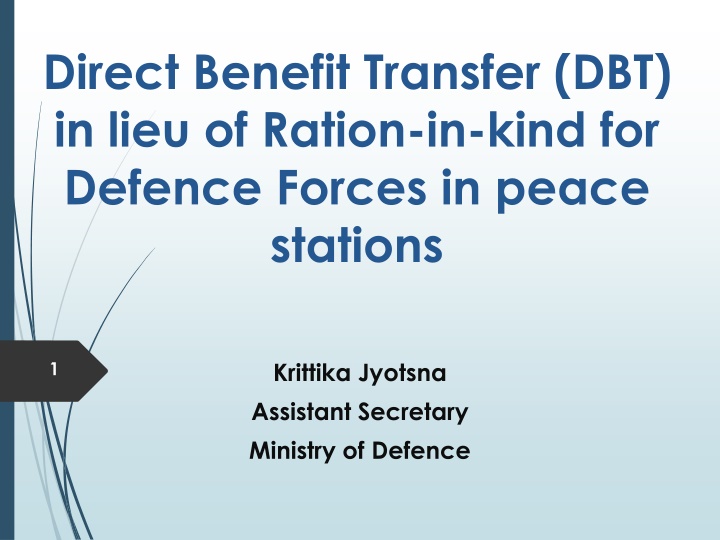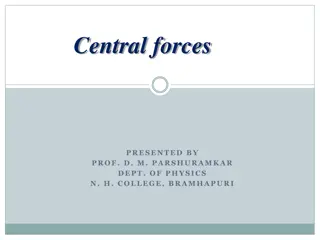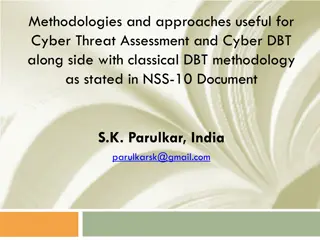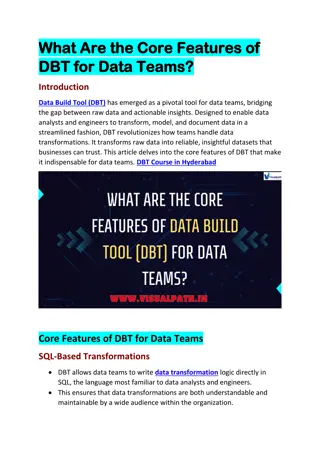Modernizing Ration System for Defence Forces: A Shift to Direct Benefit Transfer (DBT)
Explore the proposed shift from ration-in-kind to Direct Benefit Transfer (DBT) for Defence Forces in peace stations, aiming to enhance efficiency, transparency, and quality through innovative models like the Mess Committee. The current challenges, benefits, and recommendations for a successful transition are discussed, highlighting the potential advantages for both personnel and the government.
Download Presentation

Please find below an Image/Link to download the presentation.
The content on the website is provided AS IS for your information and personal use only. It may not be sold, licensed, or shared on other websites without obtaining consent from the author.If you encounter any issues during the download, it is possible that the publisher has removed the file from their server.
You are allowed to download the files provided on this website for personal or commercial use, subject to the condition that they are used lawfully. All files are the property of their respective owners.
The content on the website is provided AS IS for your information and personal use only. It may not be sold, licensed, or shared on other websites without obtaining consent from the author.
E N D
Presentation Transcript
Direct Benefit Transfer (DBT) in lieu of Ration-in-kind for Defence Forces in peace stations Krittika Jyotsna Assistant Secretary Ministry of Defence 1
Current Entitlements 2 Ration Quota for all Armed Forces personnel. Defence Institute of Physiology and Allied Sciences (DIPAS) fixes scale of ration. Ration in kind given, when with unit. Ration Money Allowance (RMA) given, when on leave.
Present Scenario 3 Army Service Corps (ASC) procures and supplies ration in peace and forward areas Complex Supply chain- ASC units, mother depots, various units Huge manpower thousand personnel involved! supply depot, of over 80
Issues Involved 4 Procurement & Cartelization Time bound. Failure of Centralized Contracts. Under and Over Provisioning. No direct say of personnel in procurement. Higher projected requirements. Unreconciled data. Transparency Issues
Loss, Wastage & Pilferage Massive operation. Long and complex supply chain. Issues of Accountability. Survey Results. Extensions to estimated shelf life. Longer period of stocking. Quality Esprit de Corps Difference in Mess quality. Point to ponder upon!
BSF Model an example 6 Operating on DBT basis @ Rs. 97/ day/ personnel and 3850 Kcal/day Mess committee model Better quality- more satisfaction Flexibility in food alternatives Lower expenses Promotes Esprit de corps
Recommendations 7 1. DBT for peace stations. (65%-70% personnel in peace stations) Mess Committee model Cash allowance to individuals as per their choice. Stress on local over centralized procurement Flexibility in food alternatives 2. Rationalization of authorization scales in peace stations
Advantages 8 For Armed forces personnel: Better Quality More Choice & Alternatives Feeling of Equality Sense of Ownership Enhances Motivation Levels
Advantages 9 For Government: Transparency and accountability Better Quality- more satisfaction Savings- due to efficient procurement & supply chain management Optimal utilization of resources More attention to forward areas
10 Thank You























